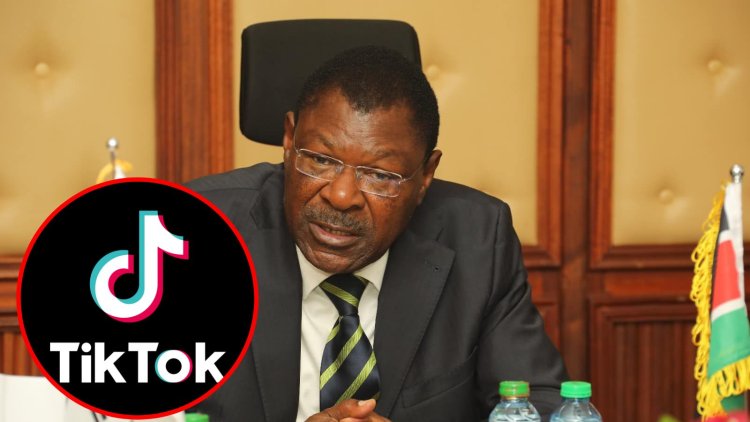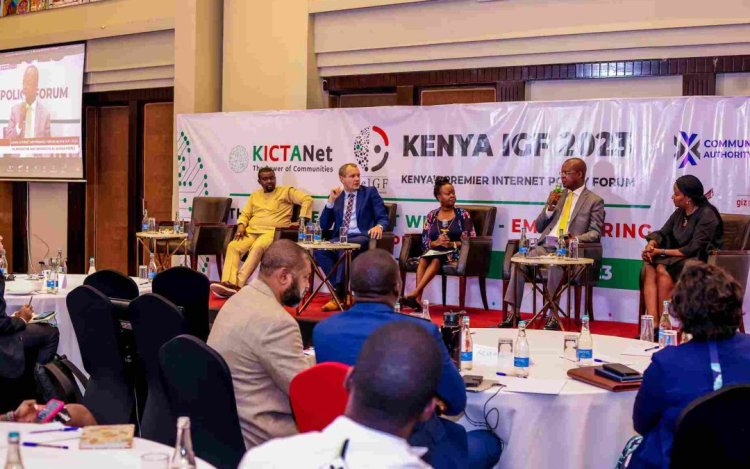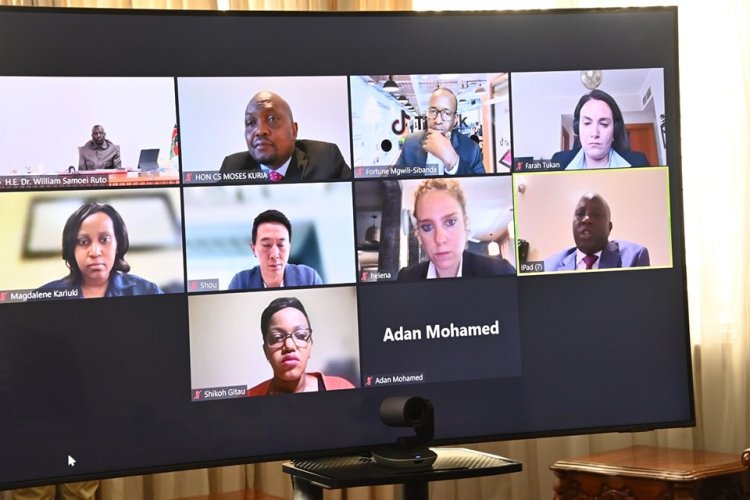Dismiss CEO Petition To Ban TikTok- Wetangula Told
KICTANet argued that TikTok, amongst other social media platforms, has emerged as a space for creative expression, entertainment, information sharing, social interaction, public participation, awareness raising, education, and engagement on a wide range of issues.

With the agreement reached between President William Ruto and TikTok CEO Shou Zi Chew to regulate the popular social media platform, the onus is on National Assembly Speaker, Moses Wetangula, to dismiss a petition that sought the outright ban of the platform in the country.
The Kenya ICT Action Network (KICTANet), a multistakeholder platform for people and institutions interested in information and communications technology (ICT) policy and regulation, called upon Wetangula and the Public Petitions Committee to reject the proposal made by a Kenyan, Bridget Connect Consultancy CEO Bob Ndolo.
In a joint statement to Parliament on Thursday, August 24, KICTANet argued that TikTok, amongst other social media platforms, has emerged as a space for creative expression, entertainment, information sharing, social interaction, public participation, awareness raising, education, and engagement on a wide range of issues.
The platform added that platforms in this time and age have also become an alternative source of relevant and credible news and information not covered by traditional or mainstream media, a notice board for ongoing events, including for government bodies, and the new digital public square for discourse, engagement and the exercise of democratic rights.

A past KICTANet forum. /KICTANET
"While social media platforms have played an important role in the realisation of rights – including freedom of expression and access to information – the proliferation of harmful content on the platforms has had severe human rights impacts, particularly during times of crisis, such as in Ethiopia.
"Platforms and companies hosting social media platforms therefore have a responsibility to put in place measures to identify and address risks presented by harmful online content that can contribute to societal harm, and lawmakers have a responsibility to protect users from harm while also upholding free expression and other fundamental rights," argued the ICT body.
KICTANet made reference to the #KeepItOn campaign against internet shutdowns in 2022 which documented platform blocks or bans in 23 countries. Many of those governments imposed the platform blocks under the justification that the platform had failed to properly moderate harmful content.
The blocks were viewed to have severely undermined freedom of expression and access to information, and yet there was no evidence that they meaningfully reduced the proliferation of harmful content or kept people safe.
"One such example includes Nigeria’s Twitter ban, which the ECOWAS court ruled unlawful. Importantly, Kenyan authorities have not taken the bait on this blunt force approach, including when authorities publicly declined to block access to Facebook during the 2022 election period," added the body.
The ICT group thus argued that imposing a straight ban on TikTok in Kenya would stifle the rights to freedom of expression, access to information, freedom of association and assembly and political participation.
It would also adversely affect the economic rights of Kenyans, and hinder the country’s progress towards a more open and inclusive digital society, adding that while the rights are not absolute, any limitation of them should satisfy the three-part test of proportionality, necessity and legality, which a total ban would not satisfy.
KICTANet thus demanded the National Assembly to reject the proposal to ban TikTok or any other social media platform in Kenya and to adopt a holistic and human rights-based approach in line with constitutional and international human rights standards to ensure the protection of citizens’ fundamental rights while addressing legitimate concerns surrounding social media use.
Parliament was also urged to engage in open and inclusive multi-stakeholder dialogue with all relevant stakeholders (including academia, civil society, tech companies, government and media) to develop effective and evidence-based approaches to address concerns surrounding social media platforms.
"Promote media information literacy and digital literacy programmes to educate citizens, with digital skills to harness online opportunities, be responsible digital citizens, enjoy their digital rights, and ensure their online safety," added KICTANet.
The firm called on TikTok to invest in adequate administrative, human, technical and financial resources in content moderation to ensure their policies, processes, structures and practices are rights-respecting, context- and culture-sensitive, efficient and effective, particularly in their non-English speaking and global majority markets.
In alignment with the UN Guiding Principles on Business and Human Rights (UNPGs), TikTok was also urged to provide periodic public reporting on progress toward the adoption and implementation of the above measures.
"Engage and collaborate with stakeholders – including academia, civil society, government, independent experts and media – in a meaningful way to get insights to ensure platform policies and enforcement practices are responsive, proportionate and consistent with human rights standards and best practices.
"Streamline transparency and accountability mechanisms, including by providing regular and comprehensive transparency reports with disaggregated data by country of the content removed from their platform and insights on how content is reviewed, flagged and removed. Such regular transparency reporting is already a de-facto standard for the tech sector in general," the statement went on.

President William Ruto holding a meeting with TikTok CEO Shou Zi Chew alongside other government officials including Trade CS Moses Kuria on August 24, 2023. /PCS
TikTok was further demanded to empower users to protect themselves from harmful content, including by adopting simplified community guidelines or standards; ensuring mechanisms for reporting harmful content and abuse are efficient and user-friendly; implementing effective remedial mechanisms for users; educating users about the risks of harmful content; providing tools and options to users to manage their online experiences such as age and content filters; and engaging in educational campaigns to promote safe and responsible platform usage and digital literacy.
It was also asked to apply principles of transparency, confidentiality, purpose limitation and data minimization to their data practices, to ensure that users have adequate knowledge and autonomy over the processing of their data.
KICTANet acted as a signatory alongside Access Now, ARTICLE 19 Eastern Africa, Bloggers Association of Kenya (BAKE), galck+, Haki na Sheria, Kenya Human Rights Commission (KHRC) and Paradigm Initiative






